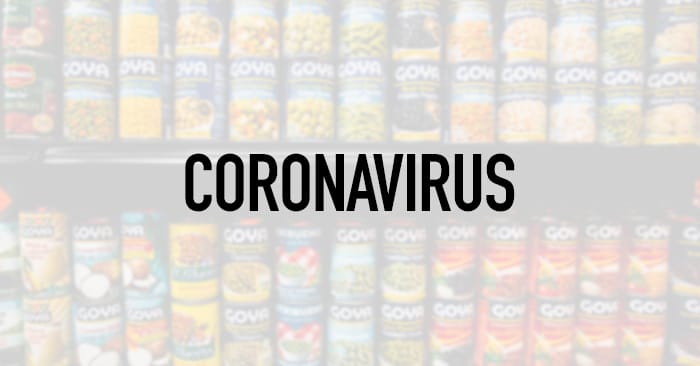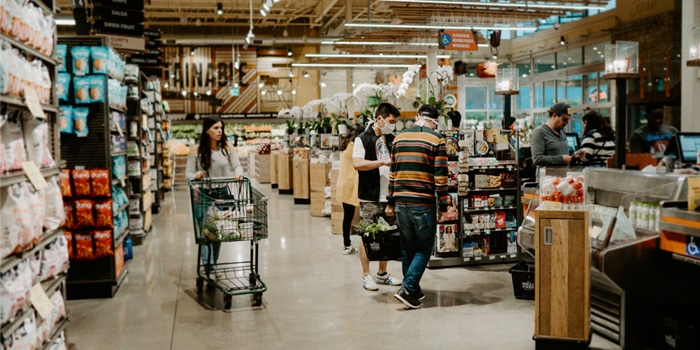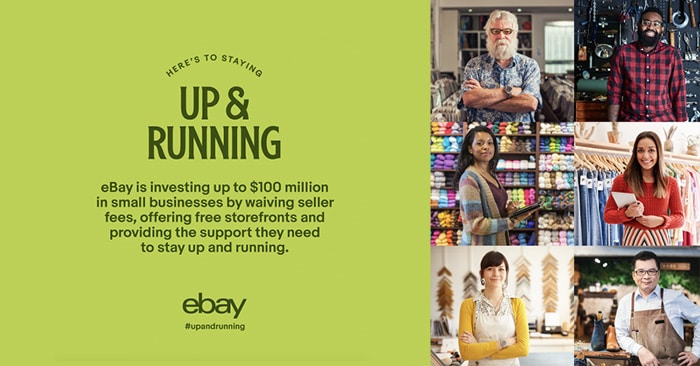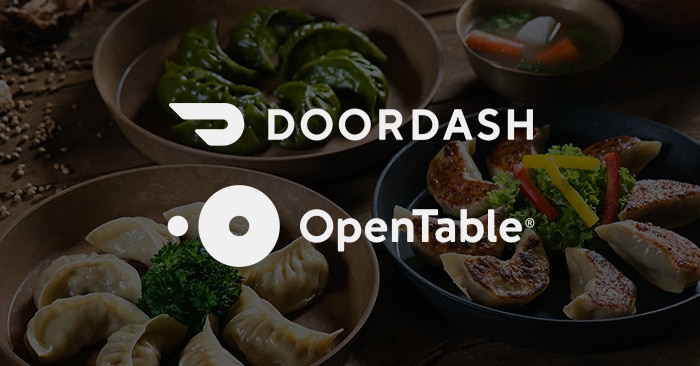COVID-19 News Roundup: FDA Addresses Food Supply; States, Retailers Set Shopping Limits

FDA Says No Food Shortages Expected
In a public service announcement yesterday, the Food and Drug Administration (FDA) restated that the U.S. food supply remains safe and the supply chain is strong, noting that it is working closely with the industry to determine potential shortages.
Despite consumers seeing empty shelves, no shortages are expected across fresh produce or packaged food, including both domestic and imported goods, Frank Yiannas, deputy commissioner for food policy and response, said. Yiannas noted products are being replenished “at a steady rate,” with manufacturers and retailers working around the clock.
“A typical store might have 50,000 food items,” Yiannas said. “We just experienced an artificial rush in sudden demand, [like] seven Thanksgiving holidays all in one weekend.”
Yiannas also said the FDA plans to reroute eggs destined for foodservice to retail, as they’ve been in high demand with prices increasing. Today the agency adjusted labeling guidance for eggs from institutions and restaurants for the duration of the COVID-19 pandemic. These eggs are usually unlabeled and sold in larger quantities then the standard dozen. For now, the FDA will allow those eggs to be sold at retail either in flats or cartons with information clearly labeled via a counter card, sign or tag.
Yiannas added that both food and food packaging are safe: consumers are more likely to catch the virus from another person, rather than from a package, even one handled by a contaminated person along the supply chain or in a store, he noted.
To help maintain FDA worker safety and accommodate travel restrictions, the agency previously announced a halt on supplier audits, along with domestic and foreign inspections, through April. Instead, the FDA will accept sampling and testing or food safety records reviews from suppliers while it works to establish an electronic inspection system, Yiannas said. It will conduct domestic inspections only when a potential threat is identified, and inspect imported foods only at ports of entry and using its risk-based screening tool, PREDICT. Yiannas noted that imported food only comprises about 15% of American food consumption, and that shortages of imported foods are unlikely.
States, Retailers Limit Grocery Capacity to Encourage Social Distancing
Connecticut Gov. Ned Lamont’s “Safe Store Rules” went into effect today, limiting grocery store capacity at 50% and capping shopping trips at one person per household. The regulations also require plexiglass at registers to protect employees and customers,recommend wiping carts with sanitizing wipes and encourage consumers to use touchless credit card transactions.
The move follows emergency orders implemented by Mayor Harry W. Rilling for the town of Norwalk.
The guidelines follow a similar set released last week by Rhode Island’s Department of Business Regulation. Rhode Island retailers can have no more than 20% of stated fire capacity and must have clearly marked six-foot spacing in lines and high-traffic areas. Additionally, employees must monitor social distancing between customers and maximize space between customers and employees at checkout.
Other state measures include designating employees to follow the Centers for Disease Control (CDC)’s cleaning guidelines as well as a ban on self-serve foods and product sampling. Stores are also instructed to hold exclusive hours for high-risk populations, restricting entry to 10% of stated fire capacity. The state is also encouraging retailers with over 25,000 square feet to offer pickup and/or delivery options.
Also effective today, Costco is capping store entry at two people per membership. In a letter on its website, president and CEO Craig Jelinek noted the company is following public health guidance through the “surge of business” it’s experienced. Changes so far have included limits on certain items and increasing sanitation protocols on shelves, registers and shopping carts, Jelinek said.
In a statement today Walmart also announced it will limit entry to five customers per 1000 square feet, or about 20% of a store’s capacity, at one time, as well as one-way traffic signage through the aisles and direct shoppers out through specific exits. Similar guidelines go into effect at Target stores tomorrow, while Kroger is testing new social distancing measures as well.
L.A. Allows Restaurants to Sell Grocery Goods
Meanwhile, the Los Angeles County Department of Public Health has developed guidelines for restaurants operating as pop-up grocery stores, according to the L.A. Times. The move will allow retailers to sell packaged goods as part of their takeout and delivery offerings. With the California Restaurant Association predicting nearly a third of the state’s restaurants could go out of business due to the pandemic’s restrictions, some owners see packaged goods as an opportunity to stay afloat.
Previously, the department had last week shut down some restaurants for doing so, the Times noted.
eBay Gets ‘Up and Running’ to Support Small Retailers
eBay yesterday announced a new accelerator program, Up and Running, which includes a pledge of $100 million to support small businesses looking to sell online.
“For the last 25 years, eBay has helped launch and grow hundreds of thousands of small businesses,” Jordan Sweetnam, SVP of eBay North America, said in a release. “eBay was built on the simple premise that connecting buyers and sellers around the world creates economic opportunity, and this is exactly what we need to be doing – now more than ever.”
According to the company, 70% of small businesses do not have an ecommerce presence. The new offering will provide a free basic store for three months in which businesses can sell up to 500 items for free, along with marketing and merchandising tools, customization features for brand building and discounted shipping supplies.
Noting customers’ desire to support local companies amid the COVID-19 pandemic, the site will highlight these small businesses over the next few weeks. Additionally, through April 14, eBay is matching $1 million in funds raised by sellers that donate to COVID-19 relief.
OpenTable and DoorDash Pivot to Retail
As foodservice establishments have become limited to offering takeout and delivery, restaurant apps are helping feed the retail demand.
Reservation platform OpenTable is launching new technology for retailers, including restaurants transitioning to a grocery store model. Shoppers can reserve shopping times to avoid lines and receive a notification when it’s time to shop. The app will follow any current or upcoming store restrictions, such as limited capacity.
To provide more options close to home, restaurant delivery app DoorDash is partnering with 1,800 convenience stores including 7-Eleven, Wawa, Casey’s General Store, and CircleK, offering essential household products for pickup and delivery. In a blog post Wednesday Mike Goldblatt, head of grocery partnerships, and Fuad Hannon, head of new business verticals, noted that a pilot of this program ran at the beginning of this year, and the company accelerated the launch to meet the current shopping demand.
Moving forward, DoorDash plans to add more c-stores to the app.
“Local businesses have been forced to change how they operate,” the post said. “We’re hopeful that this new category will open up even more opportunities to our entire community — increasing sales for the stores on our platform, providing even more convenience to our customers, and offering more earning opportunities to Dashers, all during a critical time of need.”



















